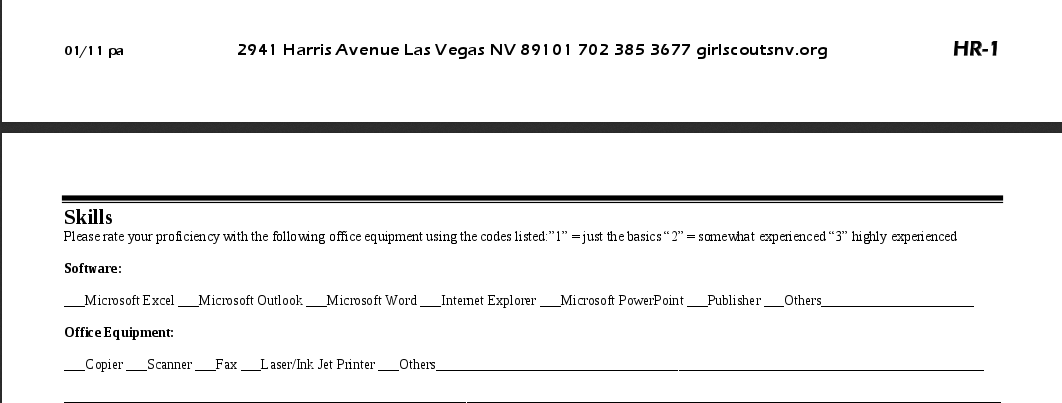Girl Scouts, other equal opportunity employers and... software discrimination

Casual browsing (more on this below) just brought me to the website of the Girl Scouts of Southern Nevada (GSSN). As many other organizations of all kinds, in the USA and elsewhere, they are, as clearly stated in their official Application for Employment:
an equal opportunity employer. All applications for employment will be considered without regard to race, religion, color, sex, age, national origin, citizenship, disability or marital status.
Page 3 of the same form asks applicants to rate their “proficiency with the following office equipment”:

Software:
_Microsoft Excel _Microsoft Outlook _Microsoft Word _Internet Explorer _Microsoft PowerPoint _Publisher _Others___
Office Equipment
_Copier _Scanner _Fax _Laser/Ink Jet Printer _Others___
GSSN will not (rightly, of course!) discriminate on the basis of race, religion and all the other things mentioned above. So, why on Earth should they (and, of course, any other equal opportunity employer) discriminate on the basis of one’s software preferences? Could they?
The software mentioned there is not some highly complex product for niche professionals. It is software for the generic, basic daily activities of pretty much every office worldwide. Expert users of LibreOffice and OpenOffice could quickly downgrade themselves to the Microsoft equivalent and still be much more productive than people with only basic skills of just that one suite. What should such users do with that form? Declare that they are only experts of “Other” (=less relevant) software, or “lie”, that is give themselves a rate correctly meaning that they won’t need babysitting just to open a spreadsheet, even if they’ve never used Excel?
This is why I provocatively call this a discrimination. In practice, it is a perfect example of the general problem I discussed here:
saying “I sent you a Bic letter” or a “Mont-Blanc letter” would be a sure way to have everyone laugh at you. Yet most people regularly say “I’ll send you a PowerPoint” or “I need to check the figures in that Excel file,” which is the same thing, but with no embarrassment.
How much sense can it make, in 2013, to still ask for any specific brand of office software in a job offer? An excellent proof of my point is the next line of that very same form, which (obviously) doesn’t mention brands of copiers, scanners and so on.
What’s your problem with the Girl Scouts of Southern Nevada anyway?
Mine, you mean? None, really. Believe it or not, I landed on that website by pure chance. At that point, as I routinely do with public administrations and NGOs of all sorts, I just tried to understand how they deal with computers and the Internet. I found some good things, like the Me and Media proposal, and the dumb form above, which I decided to comment as one case of a very general problem! All kinds of businesses and other organizations make the same mistake, it’s obviously not a “scout issue”. This said…
On Scouting and software, again
Since serendipity had brought me to look at “scouting and software” again, I went and checked the current requirements for the Computer Merit Badge of the Boy Scouts of America. While that list rightly avoids to mention any specific software program, it still contains wrong, or at least pretty misleading information:
[Explain why]… it is not permissible to accept a free copy of a paid, copyrighted computer game or program from a friend unless the game or program is considered freeware or shareware. Explain the concepts of freeware and shareware
It may be easy to make certain mistakes (heck, even Vodafone with all its lawyers did it), but they are still mistakes. Indeed, it is perfectly permissible to accept a free copy of paid copyrighted software if it is Free Software, which is not freeware or shareware. Before those two concepts, boys and girls aspiring to a Computer Merit Badge should prove they understand what “Free as in Freedom” software and “Open Source” mean.
Scouting is huge and very diverse worldwide, and I have no exhaustive data to reach any reliable, general conclusion. I’ll just say that if (again: “if) that form from Nevada and those requirements represented how the majority of scouts deal with software in 2013… maybe there has been little or no change in the nine years since Bit Prepared and Richard Stallman meeting online the World Scout Bureau. What do you think? Do you have examples of scout groups knowing and actively promoting Free Software? Please let me know.
Who writes this, why, and how to help
I am Marco Fioretti, tech writer and aspiring polymath doing human-digital research and popularization.
I do it because YOUR civil rights and the quality of YOUR life depend every year more on how software is used AROUND you.
To this end, I have already shared more than a million words on this blog, without any paywall or user tracking, and am sharing the next million through a newsletter, also without any paywall.
The more direct support I get, the more I can continue to inform for free parents, teachers, decision makers, and everybody else who should know more stuff like this. You can support me with paid subscriptions to my newsletter, donations via PayPal (mfioretti@nexaima.net) or LiberaPay, or in any of the other ways listed here.THANKS for your support!